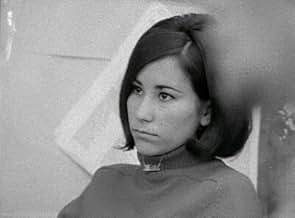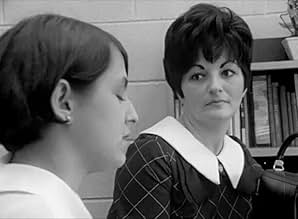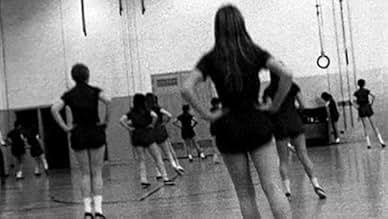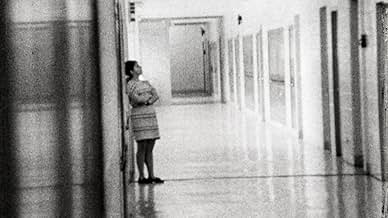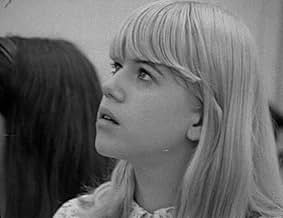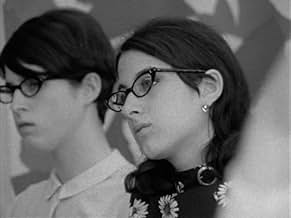IMDb-BEWERTUNG
7,5/10
2422
IHRE BEWERTUNG
Füge eine Handlung in deiner Sprache hinzuDocumentary filmmaker Frederick Wiseman takes us inside Northeast High School as a fly on the wall to observe the teachers and how they interact with the students.Documentary filmmaker Frederick Wiseman takes us inside Northeast High School as a fly on the wall to observe the teachers and how they interact with the students.Documentary filmmaker Frederick Wiseman takes us inside Northeast High School as a fly on the wall to observe the teachers and how they interact with the students.
- Regie
- Auszeichnungen
- 1 wins total
Empfohlene Bewertungen
As in TITICUT FOLLIES, Wiseman takes his camera inside an institution and exposes the authoritarianism that dominates the place. However, I have to say I was less disturbed by what I saw here. There are some clear instances of backwards attitudes: the notably different tones of the female and male sex ed lectures, what is apparently a fashion class where the teacher casually remarks of the students' physical shortcomings, and the chillingly obtuse reading of a letter from a student serving in Vietnam. But other clips that seemed designed to point out some sort of injustice or dehumanization didn't strike me as terribly egregious. Are we supposed to judge the English teacher as ridiculous for attempting to teach poetry with a Simon & Garfunkel song? When a kid says he doesn't deserve detention, are you just supposed to say "Oh, sorry about that" and let them skip it? Maybe some of the figures are a little out of touch and some are a little bit drunk on power, but I really didn't see a whole lot to make me think the school was a fascist nightmare or anything. Still, perhaps the attitudes speak louder than the actual actions, and there is a sense of isolation from the real world. And regardless of whatever messages Wiseman is trying to get across, it's a compelling look at a specific time and place.
Frederick Wiseman is, of course, one of the best documentary film-makers, a wonderfully evocative but not manipulative cinema verite director who has consistently been making quality documentaries for several decades. "High School" is now available from Zipporah films, albeit for a higher price than many films ($35), and it is arguably his most accessible feature.
Wiseman has directed several films that run longer than three hours, mind-numbingly intense documentaries which fiercely tear into their subject matter and are nearly completely thematically ambiguous, but "High School" is more a straightforward documentary, reminiscent in places of the sort of film the Maysles Brothers made, and of "Titicut Follies", perhaps the only other Wiseman film with a definitive approach to the subject matter. The film doesn't feature the sort of objectivity some of Wiseman's other films do, and even the sequel to this feature, "High School II", which looked at a 90's high school, is far more ambiguous and much longer than this lean 75-minute feature, but around as good.
Still, the film is not marred by simplistic messages and a preachy attitude. Wiseman's films, as they normally do, allow a remarkably candid, voyeuristic experience for the audience, letting us see some of the social attitudes of the era as well as capturing the timeless feel of the high school experience. In what is perhaps the film's greatest scene a teacher formally recites "The Dangling Conversation" by Simon and Garfunkel, then plays the song for the class. You see small mannerisms change, the teacher suddenly has a hopeful look in her eyes rather than one of a tired educator, and Wiseman brilliantly captures the class's reaction without the scene ever feeling contrived or forced. It's just the sort of scene that Wiseman does perfectly, asking the audience to interpret the images for themselves, never overstepping his boundaries and preaching to the audience.
"High School" is almost certainly Wiseman's most accessible film. At 75 minutes in length it goes by quite fast and although it isn't necessarily designed as entertainment it is more or less easy to watch except for those who had traumatic high school experiences. "High School II" is a more complex and ambitious film (and, of course, seen by far fewer people), but "High School" might have the edge in terms of just how effective and lean it is. It's a perfectly-structured documentary with a stunning final scene, and may be one of my favorite films.
10/10
Wiseman has directed several films that run longer than three hours, mind-numbingly intense documentaries which fiercely tear into their subject matter and are nearly completely thematically ambiguous, but "High School" is more a straightforward documentary, reminiscent in places of the sort of film the Maysles Brothers made, and of "Titicut Follies", perhaps the only other Wiseman film with a definitive approach to the subject matter. The film doesn't feature the sort of objectivity some of Wiseman's other films do, and even the sequel to this feature, "High School II", which looked at a 90's high school, is far more ambiguous and much longer than this lean 75-minute feature, but around as good.
Still, the film is not marred by simplistic messages and a preachy attitude. Wiseman's films, as they normally do, allow a remarkably candid, voyeuristic experience for the audience, letting us see some of the social attitudes of the era as well as capturing the timeless feel of the high school experience. In what is perhaps the film's greatest scene a teacher formally recites "The Dangling Conversation" by Simon and Garfunkel, then plays the song for the class. You see small mannerisms change, the teacher suddenly has a hopeful look in her eyes rather than one of a tired educator, and Wiseman brilliantly captures the class's reaction without the scene ever feeling contrived or forced. It's just the sort of scene that Wiseman does perfectly, asking the audience to interpret the images for themselves, never overstepping his boundaries and preaching to the audience.
"High School" is almost certainly Wiseman's most accessible film. At 75 minutes in length it goes by quite fast and although it isn't necessarily designed as entertainment it is more or less easy to watch except for those who had traumatic high school experiences. "High School II" is a more complex and ambitious film (and, of course, seen by far fewer people), but "High School" might have the edge in terms of just how effective and lean it is. It's a perfectly-structured documentary with a stunning final scene, and may be one of my favorite films.
10/10
Quite a remarkable study of an anonymous high school. Wiseman's strength in this film is definitely editing. He has taken seemingly a mountain of footage from probably a year in a high school and selected choice bits to make a film that completely engages, despite the apparent lack of character development and traditional narrative. The scenes and moments are incredibly interesting and glue you to the screen. Some of the best treasures are in the tiny concrete room where kids argue about their detentions. A teacher shows girls how to strut their stuff, and boys learn all about sex from a jolly gynecologist.
If you can get your hands on a copy of this, sit back and enjoy!
If you can get your hands on a copy of this, sit back and enjoy!
I love this film. It really makes you think about how high schoolers are oppressed. I love the style of this film because it has no narrative, just shots from a high school. There is no one telling you what to think or what is going on. Therefore you are forced to think for yourself about what is going on. It is very interesting to hear the reactions of teachers and students after viewing this film, as they have different interpretations.
There are a few scenes that really stand out to me. The main one being the last scene. The woman who reads the letter from the ex-student who is now in Vietnam stressed how "successful" this school has been in creating such a great student. The former student had written her a letter thatn basically stated that he no longer thinks of himself as a person, but as a body. He is humbled by his country and he will blindly obey his orders in the service. He wants his insurance money to go to the school if he gets killed in combat. It is the least he do for a school that taught him such strict discipline - so much discipline that he no longer thinks of himself as a human being with feelings!! That is what I got out of it, at least. It's a great punchline.
I would also like to comment on the closeups of the girls butts in the gym. I did not interpret this as some sexist filmmakers getting their kicks by watching the girls jump around in short shorts. I thought it was more of an ironic connection between the girl that was reprimanded at the prom for having such a short skirt. It was also a connection between the fashion show and the teacher who was trying to teach girls how to be ladylike in a very blunt and insulting manner. The school is forcing the girls to wear these ridiculous gym outfits that have very short shorts. Then they force the girls to play ridiculous games and do stupid excersizes. I think it shows how sexist the high school was, rather than the filmmakers. It made the girls all look like objects, which is exactly what the high school was practicing.
I thought it was really great how Wiseman included the entire reading of Casey at The Bat. The viewer most likely does not want to hear the teacher read this whole thing, yet we are forced to hear the whole poem read, quite dully. This shows how DULL and dehumanizing high school can be. The viewers are feeling exactly the same feelings the students must have been feeling at the time. We don't want to hear the poem, neither do the students. Yet this is the beauty and absurdity of these high school rituals.
I also liked the Spanish class in which the students are repeating the Spanish word for existentialism, and other philosophies. It is very ironic that the students are in this oppressive institution and brainlessly being forced to repeat these philosophies that preach the exact opposite.
The girl who gets defenisve about being too individualistic is also ironic. She swears her short skirt was not trying to make her "an individual", as if that was a bad thing.
It is so interesting to see how different the generational views are. One student is claiming he is "being a man" by standing up for what he believes in when being wrongly accused of acting up in class, while the vice principal says in order for him to "be a man" he must follow orders and swallow his pride. Such different views about manliness!
I could go on and on, but I will not. This is a great film. High schoolers today should watch this film, as well as "No Reason to Stay", another anti-high school film from the 60's. It will re-enforce their gut feelings that high school really does suck.
There are a few scenes that really stand out to me. The main one being the last scene. The woman who reads the letter from the ex-student who is now in Vietnam stressed how "successful" this school has been in creating such a great student. The former student had written her a letter thatn basically stated that he no longer thinks of himself as a person, but as a body. He is humbled by his country and he will blindly obey his orders in the service. He wants his insurance money to go to the school if he gets killed in combat. It is the least he do for a school that taught him such strict discipline - so much discipline that he no longer thinks of himself as a human being with feelings!! That is what I got out of it, at least. It's a great punchline.
I would also like to comment on the closeups of the girls butts in the gym. I did not interpret this as some sexist filmmakers getting their kicks by watching the girls jump around in short shorts. I thought it was more of an ironic connection between the girl that was reprimanded at the prom for having such a short skirt. It was also a connection between the fashion show and the teacher who was trying to teach girls how to be ladylike in a very blunt and insulting manner. The school is forcing the girls to wear these ridiculous gym outfits that have very short shorts. Then they force the girls to play ridiculous games and do stupid excersizes. I think it shows how sexist the high school was, rather than the filmmakers. It made the girls all look like objects, which is exactly what the high school was practicing.
I thought it was really great how Wiseman included the entire reading of Casey at The Bat. The viewer most likely does not want to hear the teacher read this whole thing, yet we are forced to hear the whole poem read, quite dully. This shows how DULL and dehumanizing high school can be. The viewers are feeling exactly the same feelings the students must have been feeling at the time. We don't want to hear the poem, neither do the students. Yet this is the beauty and absurdity of these high school rituals.
I also liked the Spanish class in which the students are repeating the Spanish word for existentialism, and other philosophies. It is very ironic that the students are in this oppressive institution and brainlessly being forced to repeat these philosophies that preach the exact opposite.
The girl who gets defenisve about being too individualistic is also ironic. She swears her short skirt was not trying to make her "an individual", as if that was a bad thing.
It is so interesting to see how different the generational views are. One student is claiming he is "being a man" by standing up for what he believes in when being wrongly accused of acting up in class, while the vice principal says in order for him to "be a man" he must follow orders and swallow his pride. Such different views about manliness!
I could go on and on, but I will not. This is a great film. High schoolers today should watch this film, as well as "No Reason to Stay", another anti-high school film from the 60's. It will re-enforce their gut feelings that high school really does suck.
"High School" is enthralling in one sense; if you are obsessed with the mundane "American Splendor" of generations past, then you will adore this documentary. For its time, it was brilliantly avant garde and remains so even today for its muted commentary on administration and the growing disparity between older generations and the younger high schoolers of the late 60's.
There is something purely amazing in viewing such settings in this vignette as they were, undoctored by Hollywood's lens. I am fascinated by the details of a time that I will never know personally and "High School" provides a brief glimpse into the mindset of the young adults of 1969 who are not unlike ourselves.
If you dig documentaries, please give this one a shot. Maybe you'll become as obsessed with "High School" as I have.
There is something purely amazing in viewing such settings in this vignette as they were, undoctored by Hollywood's lens. I am fascinated by the details of a time that I will never know personally and "High School" provides a brief glimpse into the mindset of the young adults of 1969 who are not unlike ourselves.
If you dig documentaries, please give this one a shot. Maybe you'll become as obsessed with "High School" as I have.
Wusstest du schon
- WissenswertesThis film was selected to the National Film Registry, Library of Congress, in 1991.
- Zitate
Male Authority Figure: It's nice to be individualistic, but there are certain places to be individualistic.
Female Student: I didn't mean to be individualistic.
Male Authority Figure: No, I'm not criticizing!
- VerbindungenFollowed by High School II (1994)
- Soundtracks(Sittin' On) The Dock of the Bay
(uncredited)
Written by Steve Cropper and Otis Redding
Performed by Otis Redding
Top-Auswahl
Melde dich zum Bewerten an und greife auf die Watchlist für personalisierte Empfehlungen zu.
- How long is High School?Powered by Alexa
Details
- Erscheinungsdatum
- Herkunftsland
- Offizielle Standorte
- Sprachen
- Auch bekannt als
- Student Affairs
- Drehorte
- Produktionsfirma
- Weitere beteiligte Unternehmen bei IMDbPro anzeigen
- Laufzeit
- 1 Std. 15 Min.(75 min)
- Farbe
- Sound-Mix
Zu dieser Seite beitragen
Bearbeitung vorschlagen oder fehlenden Inhalt hinzufügen

